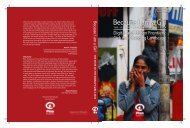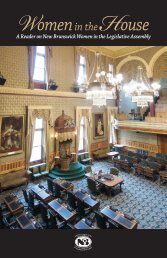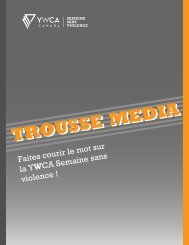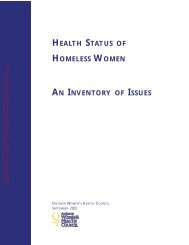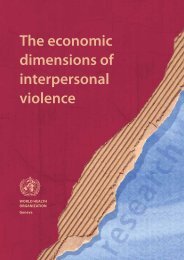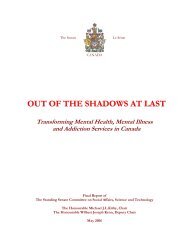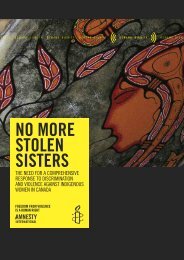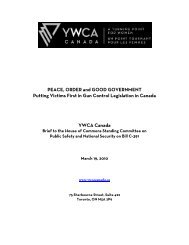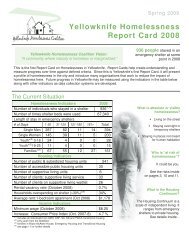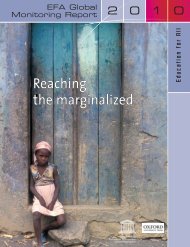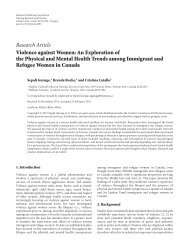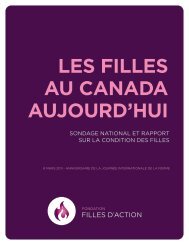Gender Report Card on the International Criminal ... - YWCA Canada
Gender Report Card on the International Criminal ... - YWCA Canada
Gender Report Card on the International Criminal ... - YWCA Canada
Create successful ePaper yourself
Turn your PDF publications into a flip-book with our unique Google optimized e-Paper software.
Judiciary – Key Decisi<strong>on</strong>s Legal Representati<strong>on</strong><br />
CAR<br />
The Prosecutor v. Jean-Pierre Bemba Gombo<br />
The first time an issue was raised c<strong>on</strong>cerning <strong>the</strong><br />
appointment of a counsel by a Defence team, was in<br />
January 2010 in <strong>the</strong> Bemba case when <strong>the</strong> Prosecuti<strong>on</strong><br />
raised c<strong>on</strong>cerns with Trial Chamber III about <strong>the</strong><br />
appointment of Nicholas Kaufman as a legal c<strong>on</strong>sultant<br />
to <strong>the</strong> Defence team. 1959 From 5 May 2008 until 4<br />
May 2009, Kaufman had worked as a P-4 Trial Lawyer<br />
for <strong>the</strong> Prosecuti<strong>on</strong>, focusing particularly <strong>on</strong> <strong>the</strong> DRC<br />
and Uganda Situati<strong>on</strong>s. On 18 November 2009, Lead<br />
Defence Counsel Nkwebe Liriss informed <strong>the</strong> Office of<br />
<strong>the</strong> Prosecutor of <strong>the</strong> appointment of Kaufman as a legal<br />
c<strong>on</strong>sultant to <strong>the</strong> Defence team. 1960 The Prosecuti<strong>on</strong><br />
objected to <strong>the</strong> appointment of Kaufman, stating that in<br />
his positi<strong>on</strong> as trial lawyer, Kaufman had been accorded<br />
‘full access to c<strong>on</strong>fidential and under seal informati<strong>on</strong> in<br />
all cases and situati<strong>on</strong>s’, including informati<strong>on</strong> about <strong>the</strong><br />
Bemba case that is not accessible to <strong>the</strong> accused and his<br />
counsel. 1961<br />
Following <strong>the</strong> formalisati<strong>on</strong> of his appointment as legal<br />
c<strong>on</strong>sultant <strong>on</strong> 12 January 2010, <strong>on</strong> 18 January 2010<br />
<strong>the</strong> Prosecuti<strong>on</strong> filed a request with <strong>the</strong> Chamber to<br />
invalidate this appointment <strong>on</strong> <strong>the</strong> basis of a c<strong>on</strong>flict<br />
of interest under Articles 12 and 16 of <strong>the</strong> Code of<br />
Professi<strong>on</strong>al C<strong>on</strong>duct for Counsel. 1962 The Prosecuti<strong>on</strong><br />
argued that Kaufman had knowledge of <strong>the</strong> strengths<br />
and weaknesses of <strong>the</strong> Prosecuti<strong>on</strong> case, as well as its<br />
strategy in <strong>the</strong> case against Bemba. The Prosecuti<strong>on</strong><br />
cited in particular to his regular interacti<strong>on</strong> with<br />
Massimo Scaliotti, <strong>on</strong>e of <strong>the</strong> Prosecuti<strong>on</strong> trial lawyers<br />
in <strong>the</strong> Bemba case, with whom Kaufman had shared<br />
an office, and his participati<strong>on</strong> in Divisi<strong>on</strong> meetings in<br />
which prosecutorial strategies for <strong>the</strong> different cases<br />
were discussed. In additi<strong>on</strong>, <strong>the</strong> Prosecuti<strong>on</strong> outlined<br />
that, for <strong>the</strong> purpose of preparing a task in relati<strong>on</strong> to<br />
<strong>the</strong> Lubanga case, Kaufman had been given access to an<br />
under seal document (<strong>the</strong> applicati<strong>on</strong> for a Warrant of<br />
Arrest against Bemba) which was not yet available to <strong>the</strong><br />
Defence in unredacted form. 1963 Finally, <strong>the</strong> Prosecuti<strong>on</strong><br />
stated that Kaufman himself acted in c<strong>on</strong>traventi<strong>on</strong><br />
of Article 24(1) of <strong>the</strong> Code of C<strong>on</strong>duct, which requires<br />
counsel to ‘take all necessary steps to ensure that his<br />
acti<strong>on</strong>s or those of o<strong>the</strong>r members of <strong>the</strong> team are not<br />
prejudicial to <strong>the</strong> <strong>on</strong>going proceedings and do not bring<br />
<strong>the</strong> Court into disrepute’.<br />
1959 ICC-01/05-01/08-670-C<strong>on</strong>f, cited in ICC-01/05-01/08-769.<br />
A public redacted versi<strong>on</strong> of <strong>the</strong> filing was later made<br />
available: ICC-01/05-01/08-670-Red.<br />
1960 ICC-01/05-01/08-670-Red, citing ICC-01/05-01/08-670-<br />
C<strong>on</strong>f-AnxA.<br />
1961 ICC-01/05-01/08-769, para 4 citing ICC-01/05-01/08-670-<br />
C<strong>on</strong>f-AnxB.<br />
1962 ICC-01/05-01/08-670-C<strong>on</strong>f, cited in ICC-01/05-01/08-769.<br />
A public redacted versi<strong>on</strong> of <strong>the</strong> filing was later made<br />
available: ICC-01/05-01/08-670-Red.<br />
1963 ICC-01/05-01/08-670-Red, para 17.<br />
On 7 May 2010 Trial Chamber III issued a decisi<strong>on</strong><br />
rejecting <strong>the</strong> Prosecuti<strong>on</strong> request. 1964 The Chamber<br />
found that by virtue of being a ‘legal c<strong>on</strong>sultant’,<br />
ra<strong>the</strong>r than a counsel for <strong>the</strong> Defence, Kaufman is not<br />
subject to a representati<strong>on</strong> agreement, cannot make<br />
oral submissi<strong>on</strong>s <strong>on</strong> behalf of <strong>the</strong> accused and as such<br />
cannot be c<strong>on</strong>sidered to be ‘practising before <strong>the</strong> ICC’<br />
for <strong>the</strong> purposes of <strong>the</strong> Code of C<strong>on</strong>duct. As such, <strong>the</strong><br />
Chamber found that <strong>the</strong> Code of C<strong>on</strong>duct does not<br />
apply to Kaufman as a legal c<strong>on</strong>sultant. However,<br />
Defence counsel is subject to <strong>the</strong> Code and cannot<br />
appoint a member to its team if that appointment<br />
creates a c<strong>on</strong>flict of interest or is o<strong>the</strong>rwise prejudicial<br />
to <strong>the</strong> <strong>on</strong>going proceedings. The Chamber stressed<br />
that ‘<strong>the</strong> determinative issue is whe<strong>the</strong>r Mr Kaufman,<br />
whilst working for <strong>the</strong> prosecuti<strong>on</strong>, became aware<br />
of more than de minimis c<strong>on</strong>fidential informati<strong>on</strong><br />
relevant to <strong>the</strong> case, which a member of <strong>the</strong> defence<br />
team should not possess’. 1965 Having analysed <strong>the</strong><br />
informati<strong>on</strong> submitted to it by <strong>the</strong> Prosecuti<strong>on</strong>, <strong>the</strong><br />
Chamber was not c<strong>on</strong>vinced that Kaufman was<br />
indeed privy to more than de minimis c<strong>on</strong>fidential<br />
informati<strong>on</strong>. The Chamber stated that <strong>the</strong> Prosecuti<strong>on</strong><br />
merely hinted at <strong>the</strong> possibility, ra<strong>the</strong>r than providing<br />
c<strong>on</strong>clusive evidence of <strong>the</strong> existence of <strong>the</strong> alleged<br />
c<strong>on</strong>flict of interest. 1966 Taken toge<strong>the</strong>r with Kaufman’s<br />
‘unequivocal asserti<strong>on</strong>s’ that he is unaware of any<br />
relevant c<strong>on</strong>fidential informati<strong>on</strong>, <strong>the</strong> Chamber<br />
rejected <strong>the</strong> Prosecuti<strong>on</strong>’s request and granted<br />
Kaufman full access to <strong>the</strong> case record. 1967 However,<br />
during a trial hearing <strong>on</strong> 25 November 2010, <strong>the</strong> Trial<br />
Chamber clarified that Kaufman could not make any<br />
oral interventi<strong>on</strong>s during <strong>the</strong> trial proceedings, by<br />
virtue of his status as a legal c<strong>on</strong>sultant. 1968<br />
In a trial hearing <strong>on</strong> 29 November 2010, <strong>the</strong><br />
Prosecuti<strong>on</strong> again raised c<strong>on</strong>cerns with <strong>the</strong> Trial<br />
Chamber about Kaufman’s positi<strong>on</strong> when it had<br />
been informed that his status had changed from<br />
c<strong>on</strong>sultant to associate counsel for <strong>the</strong> Defence. 1969<br />
The Trial Chamber advised <strong>the</strong> Prosecuti<strong>on</strong> that in its<br />
previous decisi<strong>on</strong> it determined that, although <strong>the</strong><br />
Code of C<strong>on</strong>duct did not apply to Kaufman as a legal<br />
c<strong>on</strong>sultant, it had not found any c<strong>on</strong>flict of interest<br />
to warrant <strong>the</strong> invalidati<strong>on</strong> of his appointment<br />
even if <strong>the</strong> Code would have applied to him. 1970<br />
The Chamber noted, however, that <strong>the</strong> Prosecuti<strong>on</strong><br />
was free to raise <strong>the</strong> issue in a written filing, which<br />
1964 ICC-01/05-01/08-769.<br />
1965 ICC-01/05-01/08-769, para 42.<br />
1966 ICC-01/05-01/08-769, para 43.<br />
1967 ICC-01/05-01/08-769, paras 45-47.<br />
1968 ICC-01/05-01/08-T-35-Red-ENG, p 2 lines 19-24.<br />
1969 ICC-01/05-01/08-T-37-Red-ENG, p 3 lines 1-2.<br />
1970 ICC-01/05-01/08-T-37-Red-ENG, p 3 lines 6-20.<br />
307





